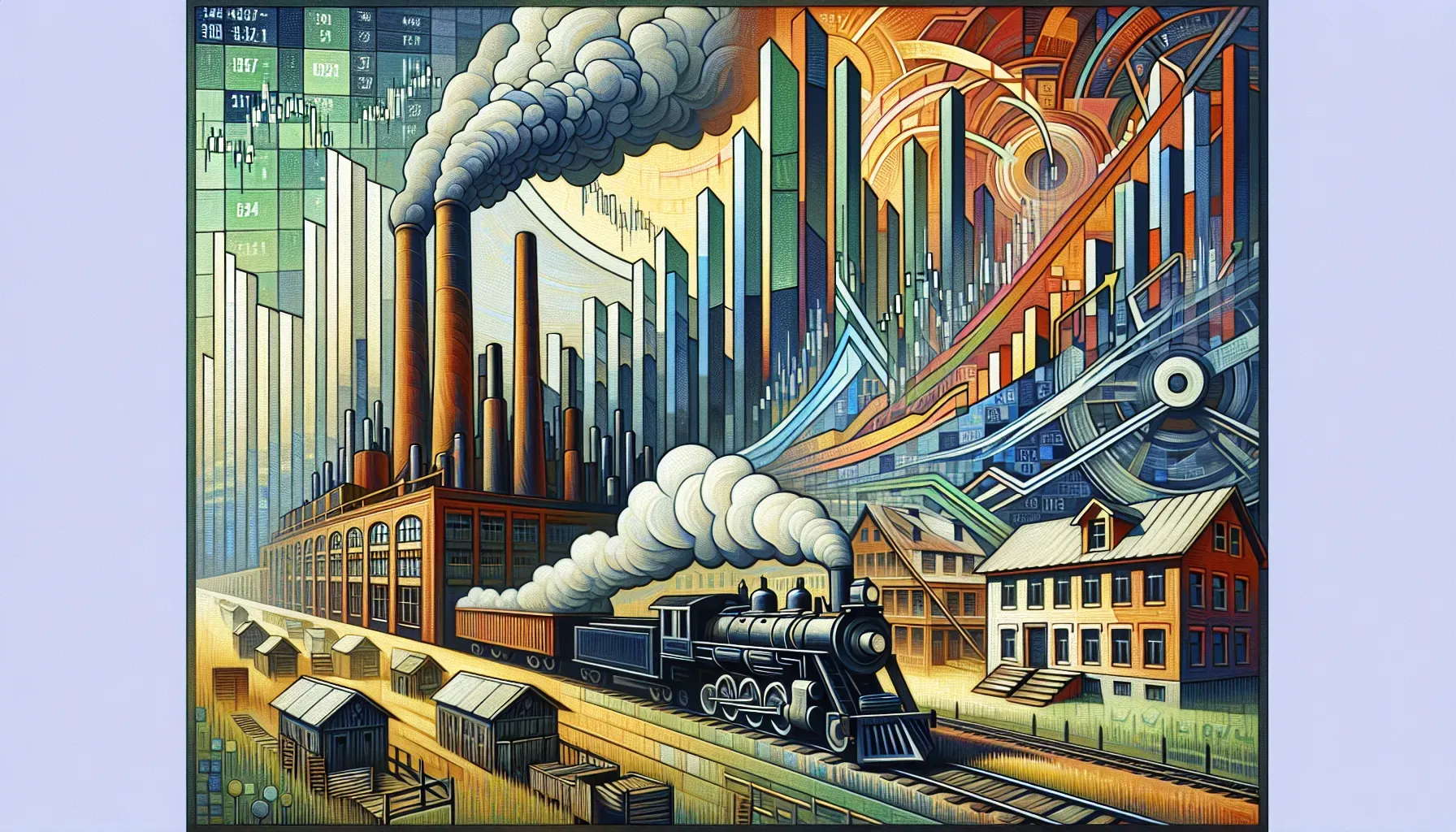Industrial Revolution Meets Finance: How Mechanization Transformed Investing

The industrial revolution brought forth an era of unprecedented economic transformation. As machinery replaced manual labor, industries witnessed exponential growth, leading to enhanced production capacities and increased productivity. This not only bolstered the economy but also facilitated the accumulation of personal wealth for individuals who were mindful and strategic in their financial decisions.
The Economic Impact of Industrial Advancements on Personal Wealth
Investors who recognized the potential of industrial advancements positioned themselves to reap substantial benefits. The burgeoning demand for goods propelled by mechanized production laid the groundwork for numerous investment avenues. From funding factories to acquiring patents for innovative technologies, astute investors leveraged industrial advancements to amass significant wealth.
With the surge in industrialization, investment opportunities proliferated across various sectors. Railroads emerged as lucrative investment options, facilitating the transportation of goods at unprecedented speeds and connecting previously isolated regions. Furthermore, financing factories and farmland development presented investors with avenues to capitalize on the increasing demand for manufactured goods and agricultural produce.
Investment Opportunities in Railroads, Factories, and Farmland
Investing in infrastructure development, such as railroads, not only yielded substantial returns but also played a pivotal role in solidifying the foundation for future economic expansion. The strategic deployment of capital into these burgeoning sectors underscored the symbiotic relationship between industrial advancements and investment growth.
The industrial revolution altered traditional wealth distribution models by ushering in a new era of wealth creation and accumulation. While erstwhile agrarian societies predominantly favored landowners, industrial advancement allowed individuals from diverse backgrounds to amass wealth through astute investments in burgeoning industries.
This shift in wealth distribution dynamics not only offered a more inclusive approach to wealth accumulation but also catalyzed a broader participation in investment activities. The emergence of a more diverse investor base marked a significant departure from traditional norms, democratizing wealth accumulation and investment participation.
Related Article: The Time Traveler's Portfolio: Aligning Millennia-Old Investment Strategies with Tomorrow's Tech Trends
Wealth Distribution Dynamics During the Industrial Revolution
The proliferation of technological innovations during the industrial revolution spurred paradigm shifts in financial strategies. The introduction of telegraph systems revolutionized communication channels and facilitated instantaneous transmission of market information. Consequently, investors could swiftly adjust their positions based on real-time market dynamics, effectively reducing investment risks.
Moreover, technological advancements drove the emergence of stock exchanges, providing investors with a centralized platform to trade securities rapidly. This accelerated the pace of financial transactions and facilitated efficient capital allocation, laying the groundwork for modern financial markets as we know them today.
Technological Innovations Shaping Financial Strategies
The confluence of mass production capabilities and market speculation redefined wealth accumulation strategies during the industrial revolution. Investors keen on maximizing their returns diversified their portfolios by investing in emerging industries such as textiles, steel production, and mechanized agriculture. This diversification bolstered their resilience against market fluctuations while capitalizing on the unprecedented growth potential offered by burgeoning sectors.
Furthermore, market speculation driven by industrial advancements heralded a new era of innovation-driven investment strategies. Investors began factoring technological breakthroughs and industrial advancements into their investment decisions, recognizing that these factors were pivotal in driving sustainable long-term returns.
Related Article: Intersectional Investing: Bringing Underrepresented Voices to the Forefront of Finance
Market Speculation and Wealth Strategies in New Industries
The transition from steam engines powering industries to stock engines driving financial innovation underscores the symbiotic relationship between industrial progression and finance evolution. Leveraging the momentum generated by industrial advancements, financial innovations such as corporate bonds, equity financing, and derivatives instruments gained prominence as avenues for raising capital and diversifying investment portfolios.
Moreover, institutional innovations such as mutual funds emerged to cater to diversified investor appetites. These financial instruments allowed investors to pool their resources into professionally managed portfolios, democratizing access to diversified investment vehicles while mitigating individual risk exposure.
The Evolution of Finance from Industry Innovations
The industrial revolution played a pivotal role in narrowing the wealth gap between affluent and middle-class investors. Traditionally confined to aristocratic circles, investing underwent a transformational shift as thriving industries provided lucrative opportunities for middle-class individuals to participate in wealth creation through investment ventures.
The democratization of investment participation fostered inclusivity across social strata, empowering individuals from varied backgrounds to actively engage in wealth accumulation activities previously reserved for elite circles. This fundamental shift propelled economic mobility and redefined societal perceptions surrounding investing as a means towards upward social mobility.
As industries flourished during the era of mechanization, social dynamics underwent profound transformations. The unprecedented economic growth driven by industrial progress catalyzed urbanization on an unprecedented scale. This urban migration reshaped societal structures and fostered burgeoning opportunities for economic prosperity beyond agrarian landscapes.
Amidst these transitions, investing emerged as a conduit for socioeconomic empowerment among diverse segments of society. The newfound accessibility to investment opportunities engendered financial empowerment among individuals previously marginalized from traditional avenues of wealth accumulation.
Narrowing the Wealth Gap Between Investors During Industrialization
The convergence of industrial revolution and finance encapsulates a transformative epoch where mechanization not only propelled economic advancement but also fundamentally reshaped personal wealth management strategies. This confluence birthed diverse investment opportunities spanning railroads, factories, and farmland development while challenging traditional wealth distribution models through inclusive participation. Moreover, it catalyzed technological innovations that redefined financial strategies and bridged the gap between rich and middle-class investors while fueling socioeconomic empowerment across societal strata.
Frequently Asked Questions
The industrial revolution significantly transformed personal wealth by enhancing production capacities through mechanization. This shift allowed individuals to accumulate wealth strategically by investing in burgeoning industries, leading to unprecedented economic growth and opportunities for financial advancement.
Investors capitalized on industrial advancements by funding factories, railroads, and innovative technologies. They recognized the growing demand for manufactured goods and strategically deployed their capital into these sectors, reaping substantial financial benefits as industries expanded rapidly.
During the industrial revolution, numerous investment opportunities emerged, particularly in railroads, factories, and farmland development. These sectors experienced significant growth due to increased demand for goods, offering investors lucrative avenues to capitalize on the expanding economy.
Mass production influenced market speculation by encouraging investors to diversify their portfolios across emerging industries like textiles and steel. This diversification allowed them to mitigate risks associated with market fluctuations while maximizing returns from rapidly growing sectors.
Technology played a crucial role in reshaping financial strategies during the industrial era. Innovations like telegraph systems enabled real-time communication, allowing investors to make informed decisions quickly and adapt their strategies based on market dynamics, thus reducing investment risks.
The industrial revolution altered traditional wealth distribution by enabling individuals from various backgrounds to accumulate wealth through investments. This shift democratized access to investment opportunities, allowing broader participation in wealth creation beyond just landowners and aristocrats.
The democratization of investment during industrialization primarily benefited middle-class individuals who previously lacked access to wealth accumulation opportunities. This shift empowered diverse social strata to engage in investing, fostering economic mobility and altering societal perceptions of wealth creation.
The relationship between industry and finance led to innovations such as corporate bonds, equity financing, and mutual funds. These financial instruments provided new avenues for raising capital and allowed investors to pool resources, enhancing access to diversified investment opportunities.
Check Out These Related Articles

Gen Z and the Investment Vanguard: Shaping the Future of Finance with Digital Savvy

The Investment Renaissance: Nurturing the Roots of Modern Portfolio Theory

Mentorship Matters: Shaping the Next Generation of Investment Leaders

